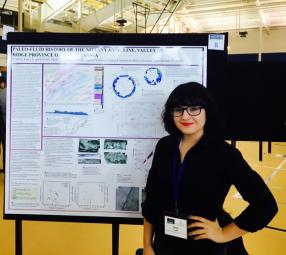
Undergraduate
Nilda Alicea-Velázquez, Ph.D.
Chemistry and Biochemistry Department
Graduate
Jillian Maynard
Elihu Burritt Library

Emily Gajda Earth Sciences URCAD presentation Fall 2016
This year’s URCAD will take place on Monday, April 28th and will feature research, scholarship, and creative work carried out by Central undergraduate and graduate students. There are no restrictions to student class rank or academic discipline for these sessions. Students will have the option to present their work in either a poster or oral presentation format.
Research in the academic sense typically refers to scholarly or scientific study of a focused subject. This broadly fits the criteria for URCAD. Typically, the work should be done either independently by the student, or in collaboration with a faculty mentor. The work should not be from a typical lecture course, though this is not a hard and fast rule. Many projects start as proposals from “research methods” or “practicum” courses. The main criteria are that the work be original and performed under the direction or supervision of a full-time member of the Central faculty.
In artistic fields, work is more often created from within the individual than pieced together from outside sources. While substantial research may be involved in the final product, the result is more personal and reflects individual feelings and expression. Often a summary of work is not sufficient for these types of presentations. Instead, students will submit tapes, manuscripts, or the like. Creative work includes, but is not limited to original compositions, artwork, dance, plays, and manuscripts. Student interpretations of published work may be considered; however, the student and faculty advisor should make a strong case as to why this constitutes original work.
Please be aware that if your research is or may be considered "generalizable" (in other words, if you plan to present or publish the results of your findings outside of Central, either at a conference or in a peer-reviewed publication), and if your work also involves human or animal subjects, you should seek review and secure approval for the project through the appropriate institutional review board, the HSC for human subjects, or the IACUC for animals. Failure to do this *before the research begins* will render your work ineligible for publication or presentation and contravenes federal regulations on research protections.
Students will have the option to show their work in the form of a poster presentation which typically consists of a series of figures or tables that tell a story with minimal text. It is important that a poster clearly and concisely states the goal of the work, the approach to achieve said goal, and the key findings from the project. Posters should be prepared using Microsoft Power Point on a 48 in x 36 in (width x height) slide.
Posters will be judged using a rubric and the best presentations in each school (CLASS, SED, SEST, SOB) will receive awards. Graduate students will be judged separately from Undergraduates.
Students will also have the option to present their work in the form of a short, 10-minute presentation (with an additional 3-5 min allowed for audience questions). Generally, oral presentation consists of a slide show that describes the background, methodology, results/discussion, and conclusions relevant to the student’s project. Oral presentation slide shows should be prepared using Microsoft Power Point.
Oral presentations will be judged using a rubric and the best presentations in each school (CLASS, SED, SEST, SOB) will receive awards. Graduate students will be judged separately from Undergraduates.
Students interested in presenting at URCAD should complete the appropriate form located at “Propose an URCAD Presentation”. The form provides an option to indicate the preferred presentation format (poster vs oral).
Submission requirements:
A completed poster or slide show is not required at the time of proposing an URCAD presentation.
Any questions or concerns regarding undergraduate submissions can be addressed to Nilda Alicea-Velázquez, Ph.D. For questions or concerns regarding graduate submissions, please contact Jillian Maynard.